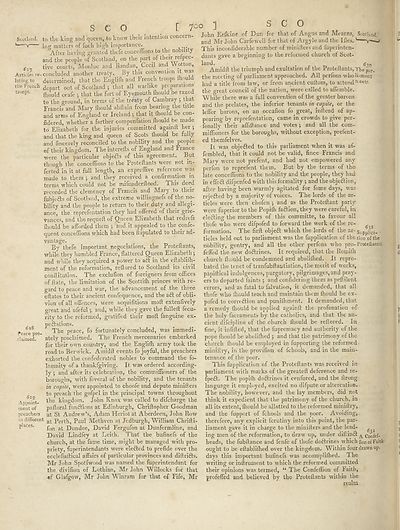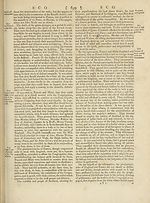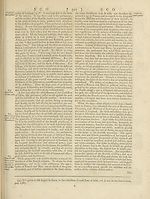Encyclopaedia Britannica, or, a Dictionary of arts, sciences, and miscellaneous literature : enlarged and improved. Illustrated with nearly six hundred engravings > Volume 18, RHI-SCR
(738) Page 700
Download files
Complete book:
Individual page:
Thumbnail gallery: Grid view | List view

SCO [7°
Scotland, to the king and queen, to know their intention concern-
'““"■'v ing matters of futh high importance.
After having granted thefe conceffions to the nobility
and the people of Scotland, on the part of their refpec-
6 tive courts, Monluc and Randan, Cecil and gotten,
Articles re-concluded another treaty. By this convention it was
lating to determined, that the Englifh and French troops mould
tlie French out 0f Scotland j that all warlike preparations
troopS- fliould ceafe 5 that the fort of Eyemouth Ihould be razed
to the ground, in terms of the treaty of Cambray j that
Francis and Mary fliould abftain from bearing the title
and arms of England or Ireland ; that it fhould be con-
fidered, whether a farther compenfation fliould be made
to Elizabeth for the injuries committed againft her 5
and that the king and queen of Scots ftiould be fully
and fincerely reconciled to the nobility and the people
of their kingdom. The interefts of England and France
were the particular objects of this agreement. But
though the conceflions to the Proteftants were not in-
ferted in it at full length, an expreflive reference was
made to them ; and they received a confirmation in
terms which could not be mifunderflood. This deed
recorded the clemency of Francis and Mary to their
fubje&s of Scotland, the extreme willingnefs of the no¬
bility and the people to return to their duty and allegi¬
ance, the reprefentation they had offered of their grie¬
vances, and the requeft of Queen Elizabeth that rediefs
fliould be afforded them ; and it appealed to the confe-
quent conceffions which had been ftipulated to their ad¬
vantage.
By thefe important negociations, the Proteftants,
while they humbled France, flattered Queen Elizabeth j
and while they acquired a power to aft in the eflablifli-
raent of the reformation, reftored to Scotland its civil
conftitution. The exclufion of foreigners from offices
of ftate, the limitation of the Scottifh princes with re¬
gard to peace and war, the advancement of the three
eftates to their ancient confequenee, and the aft of obli¬
vion of all offences, were acquifitions moft extenfively
great and ufeful ; and, while they gave the fulleft fecu-
rity to the reformed, gratified their moft fanguine ex-
peftalions.
„ r,j8 The peace, fo fortunately concluded, was immedi-
.’!aimed™ ately proclaimed. The French mercenaries embarked
for their own country, and the Englifh army took the
road to Berwick. Amidft events fo joyful, the preachers
exhorted the confederated nobles to command the fo-
lemnity of a thankfgiving. It was ordered according¬
ly j and after its celebration, the commiffioners of the
boroughs, with ieveral of the nobility, and the tenants
in capite, were appointed to choofe and depute minifters
to preach the gofpel in the principal towns throughout
v. ordnt- kingdom. John Knox was called to difeharge the
ment of paftoral funftions at Edinburgh, Chriftopher Goodman
preachers at St Andrew’s, Adam Heriot at Aberdeen, John Row
indifferent aj. per|^ paul Methven at Jedburgh, William Chrifti-
5>..ices. pon at Dundee, David Fergufon at Dunfermline, and
David Lindfey at Leith. That the bufinefs of the
church, at the fame time, might be managed with pro¬
priety, fuperintendants were elefted to prefide over the
ecclefiaftical affairs of particular provinces and diftrifts.
Mr John Spotfwood was named the fuperintendant for
the divifion of Lothian, Mr John Willocks for that
ef Glafgow, Mr John Winram for that of Fife, Mr
o ] SCO
John Erfkine of Dun for that of Angus and Mearns, Scotland,
and Mr John Carfewell for that of Argyle and the Ifles.
This inconfiderable number of minifters and fuperinten¬
dants gave a beginning to the reformed church of Scot-
land. , <j,0
Amidft the triumph and exultation of the Protefl ants, The par.
the meeting of parliament approached. All perfons whoflament
a titlf from law. or from ancient cuftom. to attendrreets=
the great council of the nation, were called to affemble.
While there was a full convention of the greater barons
and the prelates, the inferior tenants in capite, or the
lefler barons, on an occafion fo great, inftead of ap¬
pearing by reprefentaticn, came in crowds to give per-
fonally their affiftance and votes j and all the com¬
miffioners for the boroughs, without exception, prefent-
ed themfelves.
It was objefted to this parliament when it was af-
fembled, that it could not be valid, fince Francis and
Mary were not prefent, and had not empowered any
perfon to reprefent them. But by the terms of the
late conceffions to the nobility and the people, they had
in effeft difpenfed with this formality •, and the objeftion,
after having been warmly agitated for fome days, was
rejefted by a majority of voices. The lords of the ar¬
ticles were then chofen j and as the Proteftant party
were fuperior to the Popiffi faftion, they were careful, in
elefting the members of this committe, to favour all
thofe who were difpofed to forward the work of the re-
formation. The firft objeft which the lords of the ar- SuppHca-
ticles held out to parliament was the fupplication of thetion of the
nobility, gentry, and all the other perfons who pro-Proteftants.1
feffed the new doftrines. It required, that the Romiffi
church fhould be condemned and aboliffied. It repro¬
bated the tenet of tranfubftantiation, the merit of works,
papiftical indulgences, purgatory, pilgrimages, and pray¬
ers to departed faints ; and confidering them as peftilent
errors, and as fatal to falvation, it demanded, that all
thofe who ftiould teach and maintain them ffiould be ex-
pofed to correftion and punilhment. It demanded, that
a remedy ffiould be applied againft the profanation of
the holy facraments by the catholics, and that the an¬
cient difeipline of the church ffiould be reftored. In
fine, it infilled, that the fupremacy and authority of the
pope fhould be aboliftied ; and that the patrimony of the
church fhould be employed in fupporting the reformed
miniftry, in the provifion of fchools, and in the main¬
tenance of the poor.
This fupplication of the Proteftants was received in
parliament with marks of the greateft deference and re-
fpeft. The popifti doftrines it cenfured, and the ftrong
language it employed, excited no difpute or altercation.
The nobility, however, and the lay members, did not
think it expedient that the patrimony of the church, in
all its extent, fliould be allotted to the reformed miniftry,
and the fupport of fchools and the poor. Avoiding,
therefore, any explicit ferutiny into this point, the par¬
liament gave it in charge to the minifters and the lead- ^
ing men of the reformation, to draw up, under diflinft ^ c0rief-
heads, the fubftanee and fenfe of thofe doftrines which f10n of Faith
ought to be eftabliftied over the kingdom. Within four drawn up.
days this important bufinefs was accomplifhed. rI he
writing or inftrument to which the reformed committed
their opinions was termed, “ The Confeffion of Faith,
profeffed and believed by the Proteftants within the
realm
Scotland, to the king and queen, to know their intention concern-
'““"■'v ing matters of futh high importance.
After having granted thefe conceffions to the nobility
and the people of Scotland, on the part of their refpec-
6 tive courts, Monluc and Randan, Cecil and gotten,
Articles re-concluded another treaty. By this convention it was
lating to determined, that the Englifh and French troops mould
tlie French out 0f Scotland j that all warlike preparations
troopS- fliould ceafe 5 that the fort of Eyemouth Ihould be razed
to the ground, in terms of the treaty of Cambray j that
Francis and Mary fliould abftain from bearing the title
and arms of England or Ireland ; that it fhould be con-
fidered, whether a farther compenfation fliould be made
to Elizabeth for the injuries committed againft her 5
and that the king and queen of Scots ftiould be fully
and fincerely reconciled to the nobility and the people
of their kingdom. The interefts of England and France
were the particular objects of this agreement. But
though the conceflions to the Proteftants were not in-
ferted in it at full length, an expreflive reference was
made to them ; and they received a confirmation in
terms which could not be mifunderflood. This deed
recorded the clemency of Francis and Mary to their
fubje&s of Scotland, the extreme willingnefs of the no¬
bility and the people to return to their duty and allegi¬
ance, the reprefentation they had offered of their grie¬
vances, and the requeft of Queen Elizabeth that rediefs
fliould be afforded them ; and it appealed to the confe-
quent conceffions which had been ftipulated to their ad¬
vantage.
By thefe important negociations, the Proteftants,
while they humbled France, flattered Queen Elizabeth j
and while they acquired a power to aft in the eflablifli-
raent of the reformation, reftored to Scotland its civil
conftitution. The exclufion of foreigners from offices
of ftate, the limitation of the Scottifh princes with re¬
gard to peace and war, the advancement of the three
eftates to their ancient confequenee, and the aft of obli¬
vion of all offences, were acquifitions moft extenfively
great and ufeful ; and, while they gave the fulleft fecu-
rity to the reformed, gratified their moft fanguine ex-
peftalions.
„ r,j8 The peace, fo fortunately concluded, was immedi-
.’!aimed™ ately proclaimed. The French mercenaries embarked
for their own country, and the Englifh army took the
road to Berwick. Amidft events fo joyful, the preachers
exhorted the confederated nobles to command the fo-
lemnity of a thankfgiving. It was ordered according¬
ly j and after its celebration, the commiffioners of the
boroughs, with ieveral of the nobility, and the tenants
in capite, were appointed to choofe and depute minifters
to preach the gofpel in the principal towns throughout
v. ordnt- kingdom. John Knox was called to difeharge the
ment of paftoral funftions at Edinburgh, Chriftopher Goodman
preachers at St Andrew’s, Adam Heriot at Aberdeen, John Row
indifferent aj. per|^ paul Methven at Jedburgh, William Chrifti-
5>..ices. pon at Dundee, David Fergufon at Dunfermline, and
David Lindfey at Leith. That the bufinefs of the
church, at the fame time, might be managed with pro¬
priety, fuperintendants were elefted to prefide over the
ecclefiaftical affairs of particular provinces and diftrifts.
Mr John Spotfwood was named the fuperintendant for
the divifion of Lothian, Mr John Willocks for that
ef Glafgow, Mr John Winram for that of Fife, Mr
o ] SCO
John Erfkine of Dun for that of Angus and Mearns, Scotland,
and Mr John Carfewell for that of Argyle and the Ifles.
This inconfiderable number of minifters and fuperinten¬
dants gave a beginning to the reformed church of Scot-
land. , <j,0
Amidft the triumph and exultation of the Protefl ants, The par.
the meeting of parliament approached. All perfons whoflament
a titlf from law. or from ancient cuftom. to attendrreets=
the great council of the nation, were called to affemble.
While there was a full convention of the greater barons
and the prelates, the inferior tenants in capite, or the
lefler barons, on an occafion fo great, inftead of ap¬
pearing by reprefentaticn, came in crowds to give per-
fonally their affiftance and votes j and all the com¬
miffioners for the boroughs, without exception, prefent-
ed themfelves.
It was objefted to this parliament when it was af-
fembled, that it could not be valid, fince Francis and
Mary were not prefent, and had not empowered any
perfon to reprefent them. But by the terms of the
late conceffions to the nobility and the people, they had
in effeft difpenfed with this formality •, and the objeftion,
after having been warmly agitated for fome days, was
rejefted by a majority of voices. The lords of the ar¬
ticles were then chofen j and as the Proteftant party
were fuperior to the Popiffi faftion, they were careful, in
elefting the members of this committe, to favour all
thofe who were difpofed to forward the work of the re-
formation. The firft objeft which the lords of the ar- SuppHca-
ticles held out to parliament was the fupplication of thetion of the
nobility, gentry, and all the other perfons who pro-Proteftants.1
feffed the new doftrines. It required, that the Romiffi
church fhould be condemned and aboliffied. It repro¬
bated the tenet of tranfubftantiation, the merit of works,
papiftical indulgences, purgatory, pilgrimages, and pray¬
ers to departed faints ; and confidering them as peftilent
errors, and as fatal to falvation, it demanded, that all
thofe who ftiould teach and maintain them ffiould be ex-
pofed to correftion and punilhment. It demanded, that
a remedy ffiould be applied againft the profanation of
the holy facraments by the catholics, and that the an¬
cient difeipline of the church ffiould be reftored. In
fine, it infilled, that the fupremacy and authority of the
pope fhould be aboliftied ; and that the patrimony of the
church fhould be employed in fupporting the reformed
miniftry, in the provifion of fchools, and in the main¬
tenance of the poor.
This fupplication of the Proteftants was received in
parliament with marks of the greateft deference and re-
fpeft. The popifti doftrines it cenfured, and the ftrong
language it employed, excited no difpute or altercation.
The nobility, however, and the lay members, did not
think it expedient that the patrimony of the church, in
all its extent, fliould be allotted to the reformed miniftry,
and the fupport of fchools and the poor. Avoiding,
therefore, any explicit ferutiny into this point, the par¬
liament gave it in charge to the minifters and the lead- ^
ing men of the reformation, to draw up, under diflinft ^ c0rief-
heads, the fubftanee and fenfe of thofe doftrines which f10n of Faith
ought to be eftabliftied over the kingdom. Within four drawn up.
days this important bufinefs was accomplifhed. rI he
writing or inftrument to which the reformed committed
their opinions was termed, “ The Confeffion of Faith,
profeffed and believed by the Proteftants within the
realm
Set display mode to:
![]() Universal Viewer |
Universal Viewer | ![]() Mirador |
Large image | Transcription
Mirador |
Large image | Transcription
Images and transcriptions on this page, including medium image downloads, may be used under the Creative Commons Attribution 4.0 International Licence unless otherwise stated. ![]()
| Permanent URL | https://digital.nls.uk/193028301 |
|---|
| Attribution and copyright: |
|
|---|
| Description | Ten editions of 'Encyclopaedia Britannica', issued from 1768-1903, in 231 volumes. Originally issued in 100 weekly parts (3 volumes) between 1768 and 1771 by publishers: Colin Macfarquhar and Andrew Bell (Edinburgh); editor: William Smellie: engraver: Andrew Bell. Expanded editions in the 19th century featured more volumes and contributions from leading experts in their fields. Managed and published in Edinburgh up to the 9th edition (25 volumes, from 1875-1889); the 10th edition (1902-1903) re-issued the 9th edition, with 11 supplementary volumes. |
|---|---|
| Additional NLS resources: |
|

